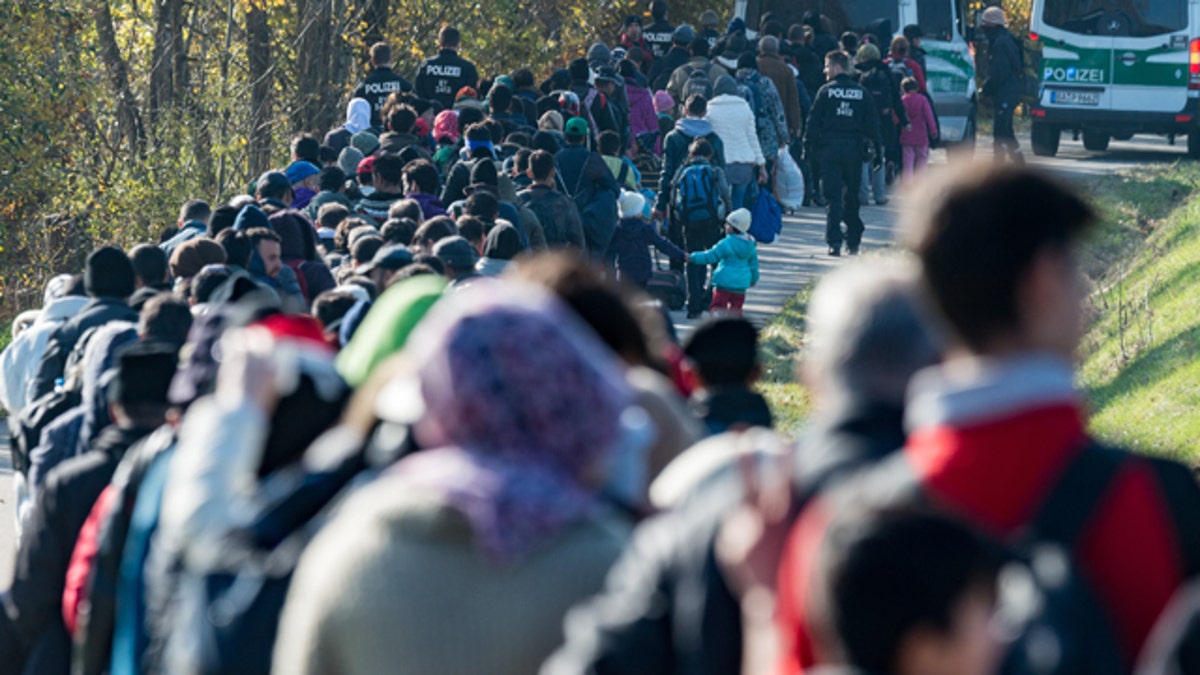
Oct. 27, 2015: Refugees are led by German Federal Police to an emergency accommodation center after crossing the Austrian-German border near Wegscheid, Germany. (Armin Weigel/dpa via AP)
Germany's top security official has sharply criticized Austria for dumping refugees at the border between the two countries Tuesday night.
Austrian authorities failed to warn Germany about the impending arrivals, many of whom are fleeing conflict and violence in the Middle East, Africa and Asia, Interior Minister Thomas de Maiziere claimed Wednesday.
"Austria's behavior in recent days was out of line," de Maiziere told the Associated Press. He said the two countries have since agreed to cooperate better.
Meantime, Austrian officials are considering building a fence along parts of the countries' common border to "be able to control the refugees in an orderly way,” state media reports.
The land route into the European Union has shifted from Hungary to Slovenia since Hungary erected a fence along its border with Serbia last month. Most refugees continue to Germany and other EU countries from Austria. Slovenia also hinted Tuesday it was considering erecting fences on its border with Croatia.
In addition, Austria is reportedly dealing with an influx in arm sales as a result of growing tensions over the refugee crisis.
According to the broadcaster OE24, approximately 70,000 more firearms have been sold in Austria so far this year compared to the same period last year. The report says that an estimated 900,000 firearms are in Austrian homes.
With a population of 8.5 million people, Austria is one of the most heavily armed countries in Europe.
"Nearly all shotguns are sold out because you don't need to have a firearms permit to buy them," Thomas Ortner, spokesman for gun retailers in the state of Upper Austria, told the paper. "Registration courses for pistols are usually held only every five weeks but are now held weekly."
According to Austrian law, anyone 18 and over can buy and own a shotgun or certain types of rifles, but they must be registered at a licensed dealer on gunsmith within six weeks of purchase. Ownership of other, more powerful weapons, such as semiautomatic weapons or repeating shotguns, requires special permission, such as a hunting license.
The report also noted that many of the new gun buyers are women. The report stated that the most common reasons given for buying a gun were fear of refugees and fear of burglars.
"Because of the social change, people want to protect themselves," one arms dealer told OE24.
Meantime in the Netherlands, officials called Wednesday for a halt to threats and intimidation amid heated debate on providing shelter for thousands of asylum seekers entering the country.
The leaders of 11 political parties in the Dutch parliament appealed to concerned citizens "not to confuse threats and insults with arguments. Let everybody speak, even if you totally disagree with them.”
In recent weeks, demonstration marches and meetings to discuss emergency housing for refugees have deteriorated into verbal abuse on both sides, including via mail and social media.
“People, whatever their view, who behave that way limit freedom for all of us,” the leaders added.
In comments to reporters during a state visit to China, King Willem-Alexander added, "In the Netherlands we talk things out, we don't fight them out."
In Sweden, the country’s immigration agency said it will discontinue publicizing the location of refugee housing facilities after more than 20 fires, many considered arsons.
Immigration officials estimate some 190,000 asylum-seekers will arrive this year, putting Sweden second only to Germany among EU members.
The Associated Press contributed to this report.
